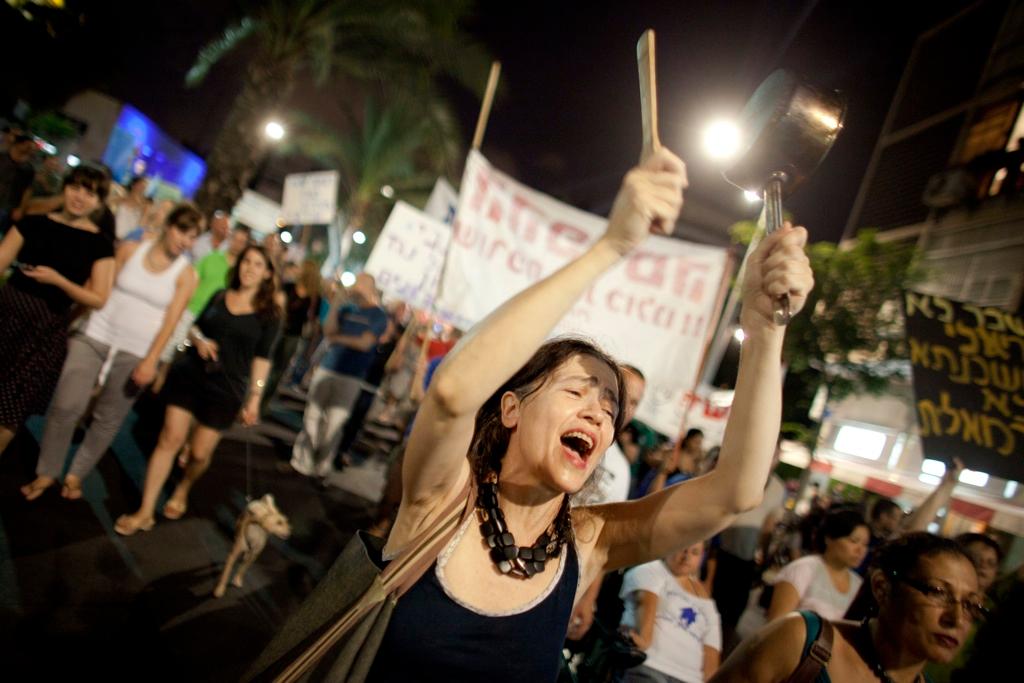All of Israel appears to be gearing up for Saturday’s protests
Israelis march to protest against rising housing prices and social inequalities on July 23, 2011 in Tel Aviv, Israel.
TEL AVIV, Israel — While Israel’s energetic protesters have yet to bring about the economic and societal transformation they aim for, they have unequivocally succeeded in one arena: conversation. Social action has become the sine qua non of social interaction.
Try buying 100 grams of butter at your local neighborhood grocery store, where the price has mysteriously gone up to 4 shekels from the 3.70 you paid three days ago. As you scramble for the extra change the cashier says, “this is why people are hitting the streets.”
The fervor that has seized the nation is now a ubiquitous talking point. Rather than asking about movies or mid-summer concerts, friends are asking each other “Which rally are you going to Saturday night?”
GlobalPost in Tel Aviv: Israel's citizenry seems to have blown a collective fuse
The Tel Aviv protest is considered the best pickup opportunity, whereas the Jerusalem tent city is viewed as the most politically mature. Israel radio traffic reports now open with detailed lists of Tel Aviv streets blocked by the growing tent city (which, incidentally, has almost entirely overrun Rothschild Boulevard, a north-south artery that was, until three weeks ago, as its name suggests, an exemplar of tree-lined stately bourgeois elegance.)
At a dinner party the night Egypt’s former president, Hosni Mubarak, appeared outfitted in funereal white, strapped to a hospital bed in an iron cage at his trial in Cairo (a sight that riveted Israelis) conversation centers around one participant who says, “I hope Bibi saw that. He should watch out.” And others, somewhat alarmed, responding “you’re not serious, are you?”
A cabbie trying to wrangle an additional 10 shekels out of a hapless late-night ride on Wednesday finds himself accused of “the kind of embezzlement everyone is striking over.”
He gives up on the three bucks. But on Thursday morning, cabbies join the national walkout.
More from GlobalPost in Tel Aviv: Foreign press plays catch up on Israeli protests
While strike leaders call for massive, unprecedented nation-wide rallies Saturday night, the third Saturday since the beginning of the social action and one week after 150,000 people took over central Tel Aviv and about 13,000 young, secular, vigorous protesters closed off Jerusalem’s King George street, Sunday is the day many are now talking about.
Jews will begin marking Tisha B’Av, the second most important day of mourning in their calendar and Muslims will celebrate the 7th Iftar of Ramadan. Both religious occasions serve as decent opportunities for social protesting, with Arab organizations calling for an Iftar of national social sacrifice and ingathering and religious Jews planning a special woeful gathering for Sunday night in Jerusalem, “to pray for the redemption of the country.”
In central Jerusalem, you can hear the unusual and welcome line, “are you going to Iftar or Tisha B’Av?” which, in its ecumenical and pacific spirit, marks a singular achievement attained by the protesters.
Every day, reporters and producers at The World are hard at work bringing you human-centered news from across the globe. But we can’t do it without you. We need your support to ensure we can continue this work for another year.
Make a gift today, and you’ll help us unlock a matching gift of $67,000!
